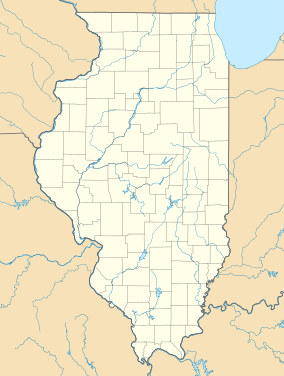Banner Marsh State Fish and Wildlife Area
 From Wikipedia - Reading time: 8 min
From Wikipedia - Reading time: 8 min
| Banner Marsh State Fish and Wildlife Area | |
|---|---|
IUCN category IV (habitat/species management area) | |
 | |
| Location | Fulton County, Illinois |
| Nearest city | Canton, Illinois |
| Area | 4,363 acres (1,766 ha) |
| Governing body | Illinois Department of Natural Resources |
Banner Marsh State Fish and Wildlife Area is an Illinois state park covering 4,363 acres (1,766 ha) in Fulton County, Illinois, United States.
History
[edit]From 1910 to 1958, the former bottomland lake and marsh were leveed and drained for farming.[1]
From the late 1880s to the mid-1980s, approximately 90% of the site was strip-mined for coal.[2][3][4]
The Illinois Department of Natural Resources purchased the land in the 1980s.[5] The Illinois Department of Natural Resources partnered with the U.S. Army Corps of Engineers on a reclamation project that was completed in May 2003. The project optimized the habitat for wildlife (fish and waterfowl), improved flood control, and increased food and cover for wildlife.[6]
The three major lakes are Johnson (600 acres (240 ha)), Wheel (350 acres (140 ha)), and Shovel (100 acres (40 ha)). There are over 200 lakes at Banner Marsh.[4]
Flora and fauna
[edit]Flora
[edit]The park borders the Illinois River and contains over 200 water bodies that serve as a freshwater marsh habitat for wildlife. The land contains scattered deep-water lakes, floodplain forests, levees, shallow marshes, and extensive grasslands.[7]
Some species of native flora include:[8] American lotus and Swamp milkweed
Fauna
[edit]Banner Marsh State Fish and Wildlife Area is home to migrating and local waterfowl, fish, and other native wildlife.
Some of the native species include: waterfowl such as duck, goose, dove, quail, pheasant, rabbit, deer, and coyote.[9]
Birds
[edit]Banner Marsh State Fish and Wildlife Area is an important stopover site for many migratory birds. The Audubon Society has chosen it as an Important Bird Area.[10] Peoria Audubon Society has spotted over 200 species of birds.[4] It also supports breeding populations for wetland and grassland birds. Some of the species of birds include: American bittern, American white pelican, bald eagle, Bell's vireo, black rail, black-crowned night heron, blue-winged teal, bobolink, double-crested cormorant, great egret, henslow's sparrow, hooded merganser, king rail, least bittern, mallard, northern harrier, orchard oriole, osprey, pied-billed grebe, rough-legged hawk, sedge wren, shorebirds, short-eared owl, terns, and Virginia rail.
Butterflies
[edit]Native plants provide a habitat for butterflies like Monarch Butterfly, Spangled Fritillary butterflies, and viceroys.
Fish
[edit]Some of the species of fish include: largemouth bass, smallmouth bass, northern pike, walleye, crappie, bluegill, redear, green sunfish, and channel catfish.[11][12]
References
[edit]- ^ "BANNER MARSH PONDS". I Fish Illinois. Illinois Department of Natural Resources. Retrieved March 7, 2023.
- ^ "BANNER MARSH PONDS". I Fish Illinois. Illinois Department of Natural Resources. Retrieved March 7, 2023.
- ^ "Banner Marsh". Retrieved March 7, 2023.
- ^ a b c "Peoria Audubon - Local Birding Site, Banner Marsh". www.peoriaaudubon.org. Retrieved October 20, 2023.
- ^ "About Banner Marsh SFWA". Illinois Department of Natural Resources. Retrieved March 7, 2023.
- ^ "Banner Marsh". storymaps.arcgis.com. Retrieved March 7, 2023.
- ^ "Important Bird Areas: Banner Marsh State Fish and Wildlife Area". National Audubon Society. Retrieved March 7, 2023.
- ^ "Banner Marsh State Fish & Wildlife Area". Illinois River Road. Illinois River Road National Scenic Byway. Retrieved March 7, 2023.
- ^ "Hunter Fact Sheets". Illinois Department of Natural Resources. Retrieved March 7, 2023.
- ^ "Important Bird Areas: Banner Marsh State Fish and Wildlife Area". National Audubon Society.
- ^ "Fishing at Banner Marsh SFWA". Illinois Department of Natural Resources. Retrieved March 7, 2023.
- ^ ILLINOIS DEPARTMENT OF NATURAL RESOURCES (2007). "STATUS OF THE CATFISH FISHERY" (PDF). Retrieved October 19, 2023.
- "Banner Marsh State Fish and Wildlife Area". Illinois Department of Natural Resources. Archived from the original on May 26, 2009. Retrieved June 4, 2009.
External links
[edit]- U.S. Geological Survey Map at the U.S. Geological Survey Map Website. Retrieved January 14, 2023.
40°32′19″N 89°50′30″W / 40.5385°N 89.8417°W
 KSF
KSF
